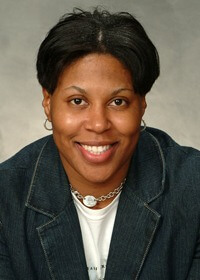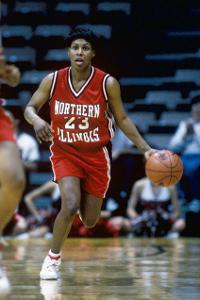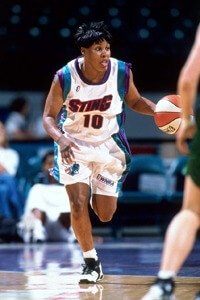
E.C. Hill spent six years at NIU as an assistant coach
With over two decades of experience in both collegiate and professional women’s basketball, University of Arizona assistant coach E.C. Hill has made a name for herself on a national level. She is not only a prestigious athlete and coach but also as a woman of the best traits, including compassion and dedication.
Hill’s career begins at Northern Illinois, an hour drive from her hometown of Chicago, where she was a two-time NIU MVP for back-to-back years and was named the North Star Conference Newcomer of the Year.
As a student-athlete, Hill’s accomplishments on the court were among the best performances that her former NIU coach Jane Albright witnessed. Albright, now head coach at the University of Nevada, has remained close with Hill, calling her family and like a daughter.
“She’s one of the best point guards to have played the game,” Albright said. “She had a quick first step, and she could do it all – one of the best players to ever play.”

E.C. Hill was a first team USBWA All-American in 1994
From 1991-1994, Albright witnessed both the on- and off-court successes of Hill. Coming out of high school, Hill had shared the title of player of year with WNBA hero and four-time Olympic gold medal winner Lisa Leslie.
“She always wanted to be better,” Albright said. “People would always ask me what E.C. stands for. I always told them it stood for Extra Charming. She always brings personality and that’s the first thing that comes with her. Whether you win or lose, she’s still E.C.”
Hill gives credit to Albright for helping her to become a better person and helping her through some of her life decisions.
“She taught me a lot of stuff off the court,” Hill said. “Like how to treat people, because sometimes us athletes are spoiled and get a lot of attention. At that time, I think I was, to be honest. She taught me things off the court more than basketball, like how to develop as a good person.”
Making the decision to play collegiate basketball was an easy one for Hill. Her love for the game has remained strong through both collegiate and professional experiences.
“I love the game of basketball,” Hill said. “To go through the things I went through as a professional and collegiate athlete, you have to love what you do. And still to this day, I love this game.”
Coming out of college as one of the most successful point guards, Hill was given the opportunity to play overseas in a professional women’s league. At the time of her graduation, there was not a women’s basketball league in the United States. Having hired an agent, Hill was given the opportunity to play in Athens, Greece for eight months.
“Back then, there was only one league,” Hill said. “Actually, when I graduated there wasn’t a women’s league in the United States. I had to go overseas. I had gotten an agent and he found me a place overseas to play.”
After her stint in the overseas league, Hill came back to the U.S. to join the American Basketball League (ABL). She was drafted to play for a team in Richmond, Va. before being traded to the New England Blizzard, where she spent much of her time.
Feeling uncomfortable with the new league, Hill had planned to return overseas, but received a call that changed her path.
“I got a call the day I was returning by New England Blizzard, and they said I got drafted by the Richmond, Va. team but got traded to New England,” Hill said. “They wanted me to report, and they told me the details. It was a better opportunity to stay in the States than to go back to Greece. The way it was set up, the league was six months, but we got paid for 12 months. The salary was good. They provided housing.”
With things looking up, the sports industry was improving and there was talk of the WNBA. After two full seasons with New England, Hill was traded to Chicago and decided to stay within the ABL even though the WNBA was beginning to emerge.
“I wanted to be loyal to the ABL because they gave me a job,” Hill said. “That same year, the WNBA began to emerge, so I got traded to Chicago, but within 10 games, the ABL had folded.”
Without much other choice, Hill went back overseas and played with Iceland for two months to prepare for the WNBA Combine in Chicago. Because Hill had graduated years prior, she was unable to be drafted, but had the opportunity to show her skills among fellow ABL athletes as well a collegiate players.
“The combine was a two-day try-out thing where all the teams watch you play,” Hill said. “I came in as a free agent because I wasn’t coming out of college. I got selected the Charlotte Sting. I got picked to go to their training camp, but I wasn’t drafted because I had come from a professional league. I was there for a month and made the team. It was a grueling process.”

E.C. Hill played two WNBA seasons
Following a pick to Charlotte, Hill played with the L.A. Sparks, Phoenix Mercury, and Orlando Miracle. During the off-season for each of these teams, Hill would go back overseas, playing in Italy and France, to continue training and making a living.
After what Hill calls a summer tour full of moving teams, she decided to hang her jersey and retire with Orlando in 2003.
Looking back at her experiences as a player, Hill sees it all as an experience that she values.
“I look at it as a good opportunity, as a good run, because I know a lot of people don’t have the opportunity that I had to play professionally,” Hill said. “It was a blessing that I was fortunate enough to play professionally. I was fortunate to even get a good scholarship for college too. It’s a great opportunity to play something that I love. If you love it, you’re going to work hard at it.”
Among her favorite memories are the ones that developed her not as a player, but as an individual.
“Going overseas made me grow up as woman,” Hill said. “To see the world and again to do something I enjoy and love, that’s a great opportunity. You have to grow up quickly overseas. I look at that period of my life as having gone through a lot of growing pains.”
The decision to continue a career in athletics came easily for Hill. With a communications degree, she began a career that means much more to her than just teaching women what it means to be successful at basketball.
“I never wanted to be outside of basketball,” Hill said. “I wanted to be in the game of basketball in some shape or form. I also wanted to make a positive impact on the girls’ lives. The same opportunity that was given to me as a student-athlete I want to give to them. Fortunately for me, I had a great experience.”
Her desire to help her players comes from being able to see what they’re going through from the outside looking in. As a former player herself, she understands the sacrifices that collegiate student-athletes face on day-to-day basis.
“I know a lot of college students nowadays don’t have a positive experience as a student athlete,” Hill said. “I want to ensure that they have a good experience, whether it’s on or off the court. I want to give back what was given to me.”
Now in her second season as assistant coach, Hill has the opportunity to coach the guards of Arizona women’s basketball. She is now making the impact on her players that her role models gave to her. With an understanding of both collegiate and professional basketball, she is able to provide knowledge and experiences unprecedented.
Her experience working with some of the most talented coaches, such as Albright, has given Hill a solid foundation for her career in coaching. She has spent her career being able to work with some of the great influences of women’s basketball and is now herself an influence to players.
“A lot of credit goes to Niya Butts, my head coach,” Hill said. “She allows me to be me. Under her leadership and development as a head coach, she has given me the opportunity to learn and make the impact on the kids. She lets me do my thing. I appreciate her for giving me the opportunity.”
by Jessie Butler, University of Arizona Athletics Communication Services
